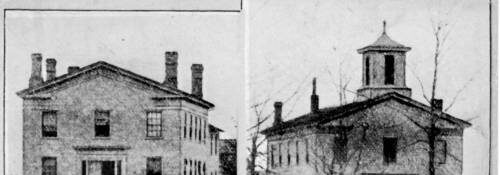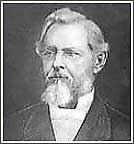
A President and His Students: Hillsdale’s Humble Beginning
Written by Monica VanDerWeide, ’95
December 4, 1844. To most, this date is unremarkable. But for all who know and love Hillsdale College, this date marks the beginning of our beloved school. Michigan Central College, as Hillsdale was originally known, held its first day of classes on December 4, 1844, in a small, deserted store in Spring Arbor. The class of five students and their professor, Daniel McBride Graham, who served as president and sole faculty member, endured cold winter winds and snow blowing through cracks in the roof as they began their studies together. Nonetheless, they persevered, and this humble start planted the seeds of an institution now 177 years old. Who were these pioneering students and their president who ventured to a new college in a tiny village on the Michigan frontier? While we don’t have records for all of them, those for whom we do exemplify the same noble characteristics that have defined Hillsdale students throughout our school’s history.
Daniel McBride Graham
 Graham was just 27 years old when he accepted the offer of the presidency from the College’s board of trustees. An 1844 graduate of Oberlin College and a Free Will Baptist, Graham also received a license to preach in October 1844. His early sermons in Spring Arbor advocated education and temperance and denounced slavery as a “national sin.” Graham was ordained as a Free Will Baptist pastor in 1847, and the following year, he left Michigan Central College to become pastor of a church in Maine. During his lifetime, he served congregations in New York, Maine, Illinois, and Massachusetts; edited the Free Will Baptist Quarterly and the Christian Freeman, wrote the Life of Rev. Clement Phinney, and tinkered with inventions on the side, receiving patents for new chemical processes and apparatuses. Graham had a second turn as president of Hillsdale from 1871-1874, overseeing the rebuilding of the campus after the devastating fire of 1874.
Graham was just 27 years old when he accepted the offer of the presidency from the College’s board of trustees. An 1844 graduate of Oberlin College and a Free Will Baptist, Graham also received a license to preach in October 1844. His early sermons in Spring Arbor advocated education and temperance and denounced slavery as a “national sin.” Graham was ordained as a Free Will Baptist pastor in 1847, and the following year, he left Michigan Central College to become pastor of a church in Maine. During his lifetime, he served congregations in New York, Maine, Illinois, and Massachusetts; edited the Free Will Baptist Quarterly and the Christian Freeman, wrote the Life of Rev. Clement Phinney, and tinkered with inventions on the side, receiving patents for new chemical processes and apparatuses. Graham had a second turn as president of Hillsdale from 1871-1874, overseeing the rebuilding of the campus after the devastating fire of 1874.
Andrew Jackson Graham
The younger brother of President Graham, Andrew Graham shared his spirit of creativity and inventiveness. He developed Graham’s Standard Phonography, a system of shorthand that was considered to be superior in accurately capturing the words of fast speakers. The First Hundred Years of Hillsdale College describes Andrew Graham as “a giant among men, not only in physical stature but in strength and calibre.”
Clinton Bowen Fisk
A New York native whose family moved west to Coldwater, Michigan, when he was young, Fisk began his college studies at Albion Seminary before becoming one of the first five Michigan Central College students. He was a businessman in Coldwater for many years before moving to St. Louis, Missouri, in 1859 to work in the insurance business. During the Civil War, he rose from the rank of private to brevet brigadier general in the Union Army. After the war, he served as an assistant commissioner in the Freedmen’s Bureau, helping to establish the first public schools in the South for both black and white children. He secured former military barracks in Nashville, Tennessee, for the establishment of a school dedicated to educating freed slaves, which was named Fisk University in his honor. Fisk later joined the Prohibition Party, running for governor of New Jersey in 1886 and then for president of the United States in 1888. He died in 1890 and was buried in Coldwater.
Livonia Benedict Perrine
Livonia Benedict holds a special claim in the history books: she was the first female to graduate with a full classical degree from a Michigan college, receiving her bachelor of arts degree from Michigan Central College in 1852. After her graduation, she taught Latin and Greek at nearby Albion College. She later served as chair of mathematics and preceptress at Albion. In 1854, she married Dr. William Perrine, a former Michigan Central student and natural sciences professor at Albion, and they had five daughters. She helped to organize the Women’s Christian Temperance Union, as well as an auxiliary of the Women’s Foreign Missionary Society in Michigan. Livonia lived to be 92 years old. Upon her death, her pastor, Rev. J.S. Wilds, said of her: “If one should say to me that scholarship is antagonistic to discipleship—that education is incompatible with religion, I have, in Mrs. Perrine, the finest scholar and the truest Christian, a sufficient refutation of any such contention. She was born and bred in the atmosphere of a college, yet all her intellectual acquisitions were but pathways to God and to Heaven.”
 Monica VanDerWeide is Director of Marketing Content for Hillsdale College. She graduated from Hillsdale in 1995 with a degree in English and German.
Monica VanDerWeide is Director of Marketing Content for Hillsdale College. She graduated from Hillsdale in 1995 with a degree in English and German.
Published in November 2021